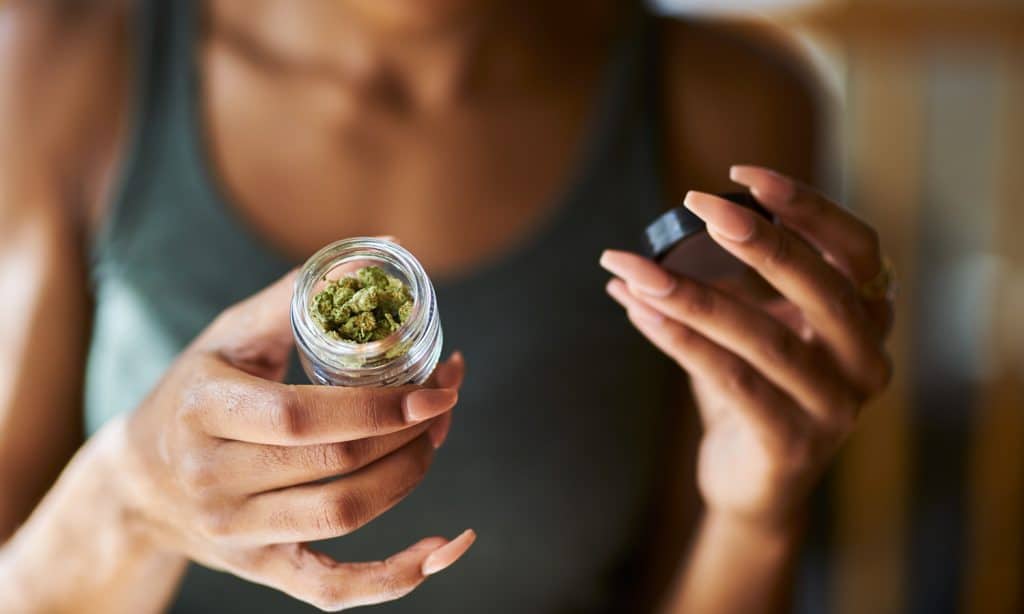32% Cannabis Job Growth In 2020, Despite COVID-19

In four years, the cannabis industry’s job growth has increased 161%, quickly beating predictions from other industries 10 years from now.
Leafly’s fifth annual cannabis jobs report showed the cannabis industry to support 321,000 full-time equivalent jobs in 2021! An incredible number for an amazing and highly-deserving industry.
Cannabis jobs aren’t accurately reported to the Department of Labor because it’s federally illegal, so in partnership with Whitney Economics, Leafly has been filling that gap since 2017! The result is a goldmine of knowledge, and always filled with incredible cannabis job data.
The 2021 report found that there are more legal cannabis industry employees in the United States than:
- Electrician engineers
- EMTS and paramedics
- Dentists (more than twice as many!)
The United States added 77,300 full-time jobs in the cannabis industry in 2020, despite the ravaging pandemic. This represents a 32% year-over-year job growth, which is absolutely phenomenal considering 2020 was the worst year for U.S. economic growth since World War II.

Photo by
Ivan-balvan/Getty Images
Cannabis Job Breakdown by State
Medical marijuana has been legalized in 37 US states, and there’s an adult-use market in 15 states and Washington D.C. According to the report:
- There are more cannabis employees in Florida than plumbers
- Michigan employs more cannabis industry professionals than cops
- California employs more cannabis workers than bank tellers
California
- Added 23,707 cannabis jobs in 2020
- Has 59,970 total cannabis jobs
- The state’s industry grew 80% from 2019 to 2020
Colorado
- Added 4,338 cannabis jobs in 2020
- Has 35,539 total jobs
- Executed $2.28 billion in cannabis sales in 2020
Florida
- Added 14,981 jobs in 2020
- Has 31,444 total jobs
- Florida sales more cannabis than any other state besides California and Colorado, despite only being legal medically
Oregon
- Added 687 jobs in 2020
- Has 17,981 total jobs
- Did $1.1 billion in sales last year, putting the state at the $1 billion mark for the first time
Washington
- Added 524 jobs in 2020
- Has 19,873 total jobs
- If cannabis was counted alongside WA’s other agricultural commodities (cherries, apples, etc.), it would rank in the top 10 in economic value
Illinois
- Added 8,348 jobs in 2020
- Has 16,837 total jobs
- Chicago, a city with 1 million Black residents, still doesn’t have even one Black-owned dispensary

Photo by rez-art/Getty Images
Comparing the Cannabis Industry’s Growth to Other Industries
If you’ve learned anything from reading this article, it’s that the cannabis industry is booming. Therefore, job creation is, too.
In four years, the cannabis industry’s job growth has increased 161%, quickly beating predictions from other industries 10 years from now. Leafly’s 2021 report found in 10 years from now:
- Speech pathology will grow 25%
- Animal caretaking will grow 23%
- Data analysis will grow by 32%
- Home health aides will grow by 34%
- Solar power installation will grow by 51%
- Nurse practitioners will grow by 52%
- Wind turbine techs will grow by 61%
Even the largest job growth, wind turbine techs, won’t achieve the same growth in 10 years as the cannabis industry already has in just four years!
The COVID Effect: How Cannabis Businesses Thrived During the Pandemic
When the coronavirus began to spread and reached other parts of the world, the cannabis industry was concerned (those of us at The Green Market Report included) that our space would take a massive hit. Most of us were bracing for impact, and waiting for the worst.
Surprisingly, the glorious opposite happened (for most.) Unfortunately, all industries have lost some businesses due to the pandemic, but cannabis businesses were deemed essential pretty much everywhere. Cannabis retailers responded beautifully, and innovative responses included:
- Curbside pickup
- Delivery
- Limited customers inside once indoor service began again
It’s also amazing considering many retailers, like MedMen, faced unmanageable losses when rioters stole and destroyed their storefront during last summer’s protests. Many retailers were forced to start over, yet the industry continued to boom.
Cannabis employment also looks different during the days of COVID, as less employees are required and more people have to stay home for various COVID-related reasons. One business owner reported more staff turnover during 2020 than the last five years.
Massachusetts retailers sold $700 million worth of cannabis products in 2020, compared to $400 million in 2019 – even with Gov. Charlie Baker’s statewide shutdown temporarily halted all retail sales in April. Cannabis stores in Massachusetts still posted a 75% annual sales gain over 2019, despite the shutdown.
The report says:
- Cannabis consumers increased their monthly spend by 33%
- Sales increased at the beginning of March and continued to rise, then plateaued in April-May
- There was a 71% increase in cannabis sales from 2019 to 2020
- Americans bought $18.3 billion worth of cannabis products in 2020
Black-Owned Cannabis Businesses Are Still Sparse
A lack of diversity is an issue that has been plaguing the cannabis space since legalization began, and according to this year’s report – we still have much work to do.
Very few states have public data relating to racial or gender diversity in the cannabis space, but Cannaclusive is doing just that. Cannaclusive’s database includes:
- 500 Black-owned cannabis businesses
- Black Americans only represent 1.2-1.7% of all cannabis company owners
Some of the most troubling points for diversity in the cannabis industry:
- Illinois added 8,000 cannabis jobs last year. Not a single minority-owned business is a finalist for one of the new 75 store licenses expected to be issued in 2021
- Only 1% of cannabis retail stores are Black-owned. This is three stores out of 260 across the state
Though this data is concerning, privately funded equity and incubator programs are answering the call to action and making more funds available to minority business owners.
420 Intel is Your Source for Marijuana News
420 Intel Canada is your leading news source for the Canadian cannabis industry. Get the latest updates on Canadian cannabis stocks and developments on how Canada continues to be a major player in the worldwide recreational and medical cannabis industry.
420 Intel Canada is the Canadian Industry news outlet that will keep you updated on how these Canadian developments in recreational and medical marijuana will impact the country and the world. Our commitment is to bring you the most important cannabis news stories from across Canada every day of the week.
Marijuana industry news is a constant endeavor with new developments each day. For marijuana news across the True North, 420 Intel Canada promises to bring you quality, Canadian, cannabis industry news.
You can get 420 Intel news delivered directly to your inbox by signing up for our daily marijuana news, ensuring you’re always kept up to date on the ever-changing cannabis industry. To stay even better informed about marijuana legalization news follow us on Twitter, Facebook and LinkedIn.




